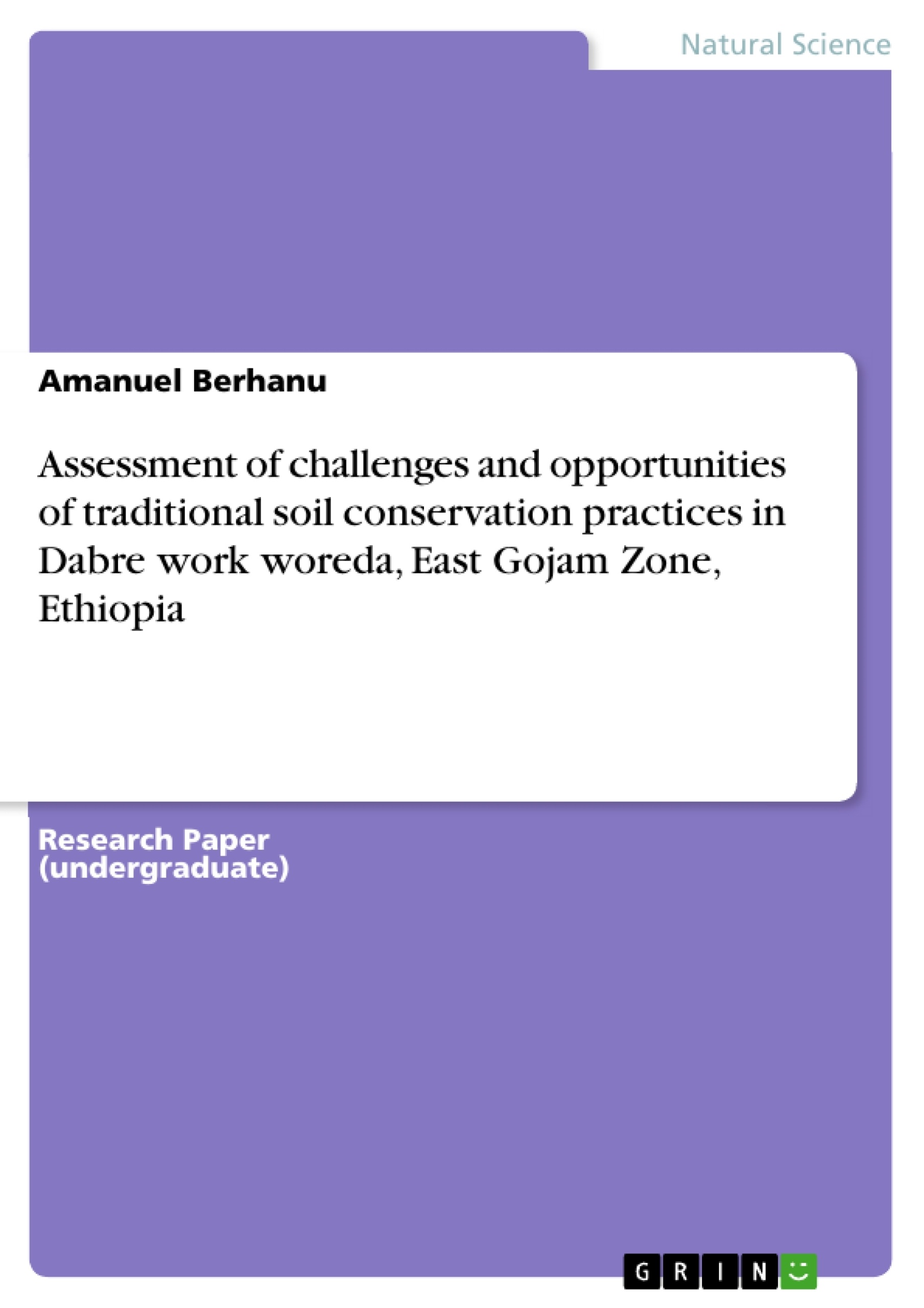The study was conducted in Diyateba kebele and Dijumeti kebeles at Debirework Woreda, East Gojjam zone. The major purpose of the study was to assess the opportunity and challenges of traditional soil conservation practices in Diyateba kebele and Dijumeti kebeles kebele. It also among at investigate the opportunities and challenges of traditional soil conservation practices. The data for this study were collected from both primary and secondary sources by using simple random sampling techniques. The primary data was collected through questionnaires and interviewing farmers who have long history and more experience about the data. The secondary data sources were taken from books and Diyateba kebele and Dijumeti kebele Administrative office.
The study should that the farmers of the study area have a good awareness of the negative effects of soil erosion on socio-economic and environmental aspects of the society. To overcome the negative effects, farmers of the study area have practice several traditional soil conservation measures. These practices are both biological (application of manure, crop rotation) and structural measures (soil or stone bund) to protect soil from and maintain soil fertility. To apply those traditional soil conservation practices there are opportunities like distance from homestead, presence of livestock ,area of cultivated land and absence of inorganic fertilizer. And has challenges like socio-economic, farm institutional and technological challenges. To reduce these problems, there should be improved knowledge of local communities 'towards traditional soil conservation practices.
Table of Contents
Abstract
1. INTRODUCTION
1.1 Background of the study
1.2 Statement of the problem
1.3. Objectives of the study
1.3.1 General objective
1.3.2. Specific objectives
1.4 Research questions
1.5. Significance of the study
1.6 Scope of the study
2. LITRATURE REVIEW
2.1. Concepts of soil conservation and soil erosion
2.1. 1. Soil Erosion
2.1.2. Soil conservation
2.2. Soil conservation in Ethiopia
2.3 Traditional soil conservation methods
2.3.1: Soil bund
2.3.2: Animal dung
2.3.3 Crop Rotation
2.3.4. Application of manure
2.3.5. Crop rotation
2.3.6. Soil or Stone bund
2.4. Opportunities of traditional soil conservation practice
2.5. Challenges of traditional soil conservation practice
2.5.1 Socio cultural challenges
3. RESEARCH METHODOLOGY
3.1 Description of the Study Area
3.2 Research design
3.3 Sources and types of Data
3.5 Sampling Techniques and Sample Size
3.6 Data analysis
3.7 Hypothesis of Variables
3.7.1 Independent variables
3.6.2 Dependent variable
4. RESULTS AND DISCUSSION
4.1 Descriptive Statistics
4.2 Socio-demographic characteristics
4.2.1 Sex, Age and marital status of Respondents
4.3. Nature, Type and problem of erosion in the study area
4.4 Farmers perception on Cause of soil erosion in the study area
4.5 Effects of soil erosion in the study area
4.6 Traditional soil conservation methods being practiced in the study area
4.6.1: Soil bund
4.6.2: Animal dung
4.6.3 Crop Rotation
4.7 Practices of soil and water conservation
4.7.1 Traditional Cut-off Drains
4.7.2 Traditional waterways
4.7.3 Drip irrigation
4.8 Challenges of Traditional Soil Conservation Practices in the Study Area
4.8.1 Socio cultural challenges
4.8.2 Deforestation
4.9 Opportunities of Traditional soil conservation practices in the study area
5 CONCULISION AND RECOMMENDATION
5.1 CONCULISION
5.2 Recommendation
6. REFERANCES
- Quote paper
- Amanuel Berhanu (Author), Assessment of challenges and opportunities of traditional soil conservation practices in Dabre work woreda, East Gojam Zone, Ethiopia, Munich, GRIN Verlag, https://www.hausarbeiten.de/document/1020380



